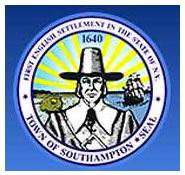 Southampton, escaping possible millions in legal fees and penalties, signed a deal on Sept. 8 with the East End Eruv Assn., Verizon and Long Island Lighting allowing Jewish religious markers on utility poles. Citizens claimed “sell-out.”
Southampton, escaping possible millions in legal fees and penalties, signed a deal on Sept. 8 with the East End Eruv Assn., Verizon and Long Island Lighting allowing Jewish religious markers on utility poles. Citizens claimed “sell-out.”
The four-page settlement, says SH will not challenge the June 30 ruling of New York Supreme Court of Suffolk that lechi markers are not “signs,” and recognizes that an eruv “is not an unconstitutional establishment of religion under the First Amendment,” as found by the Jan. 6 ruling of the Second Circuit Appeals Court.
The terms, obtained via the Pacer portal to court documents, say “Plaintiffs agree not to seek any damages or attorneys’ fees against any of the defendants, their official agents or employees, arising out of the Actions.”
Citizens, commenting on the story on 27east.com, lambasted Supervisor Anna Throne-Holst and the Council for failing to “fight for the Amendment rights” of residents.
“Since when has a governmental body in this country had the right to stop fighting for our Constitutional Rights, especially without consulting those of us who elected you to office?” asked Westhampton resident Peter Zegler.
The SH Council, in the last few moments of its meeting Aug. 25, voted to make a deal with EEEA—allowing lechi markers wherever EEEA wanted to put them on utility poles in return for EEEA’s promise not to seek legal costs and penalties. No discussion by the public was allowed at the meeting and Council members passed the resolution without saying anything.
SH has already paid close to $800,000 in fees to Jaspan Schlesinger in the dispute and also spent considerable staff time in doing the discovery demanded by the EEEA suits.
However, critics of SH note that the town’s budget is $80 million and such costs are but a small part of this. A motive for Throne-Holst’s leadership in this issue, they say, is her announced quest for the seat of Rep. Lee Zeldin in the U.S. House of Representatives in the 2016 election.
Zeldin is the only Republican Jewish member of the House. Throne-Holst fighting against eruvim in the Hamptons could be a hindrance to her candidacy.
“Highhatsize,” knocking the deal on 27east.com, said an eruv “creates an enormous notional temple thus enabling Orthodox congregations to finesse prohibitions against Sabbath behavior…” His previous comments on 27east were that the Hamptons towns were succumbing to “blackmail” and “extortion.”
Zegler said the deal allows the EEEA to construct “a Jewish community” using telephone poles on public property. “I don’t want the place where I live to be called a Jewish community,” he wrote. “The Constitution says Congress shall make no law respecting the establishment of a religion. What is so hard to understand about that?” he asked.
WHB, Quogue Not in Deal
Westhampton Beach and Quogue are not part of the settlement, which was supervised by U.S. Magistrate Judge Kathleen Tomlinson via a telephone conference that lasted from 10:17 a.m. to 10:24 a.m. Sept. 10 (seven minutes).
Conjecture is that WHB may seek the same kind of agreement. It has been claiming that it never opposed an eruv in WHB and should not have been part of any lawsuits.
Marvin Enzer, president of EEEA, has said that the liability of the towns would be in the “multi-millions.” Brian Sokoloff, outside lawyer for WHB, said on Sept. 3 that WHB faced penalties and legal costs of “more than a million.”
Unlike SH and Quogue, which claimed their sign laws prohibited the lechi symbols, WHB never made such a claim. Quogue thus far is continuing to insist that it has a strong sign law that blocks anything on utility poles not approved by the town.
Defendants are not to object to “the attachment, existence, restoration, maintenance and repair of lechis resembling those presented to the Southampton Zoning Board of Appeals including in the hearings held on April 4, 2013 and June 6, 2013, which EEEA may affix to utility poles pursuant to licenses from Verizon or LIPA.”


 Husch Blackwell Strategies has added FleishmanHillard alum Michael Slatin as a principal in its public affairs group.
Husch Blackwell Strategies has added FleishmanHillard alum Michael Slatin as a principal in its public affairs group. Rory Cooper, a veteran Republican operative and policy specialist, has joined Teneo’s Washington office as senior managing director in its strategy & communications practice.
Rory Cooper, a veteran Republican operative and policy specialist, has joined Teneo’s Washington office as senior managing director in its strategy & communications practice. Brian Fallon, who served as national press secretary for Hillary Clinton’s 2016 presidential run, is signing on next month as Vice President’s Kamala Harris’ campaign communications director.
Brian Fallon, who served as national press secretary for Hillary Clinton’s 2016 presidential run, is signing on next month as Vice President’s Kamala Harris’ campaign communications director. TikTok is nothing more than a Chinese propaganda tool that poses “a grave threat to America’s national security and, in particular, impressionable children and young adults,” say two Congressmen who want the platform registered as a foreign agent.
TikTok is nothing more than a Chinese propaganda tool that poses “a grave threat to America’s national security and, in particular, impressionable children and young adults,” say two Congressmen who want the platform registered as a foreign agent. Public Strategies Washington has added Abbie Sorrendino, a former aide to now Senate Majority Leader Chuck Schumer.
Public Strategies Washington has added Abbie Sorrendino, a former aide to now Senate Majority Leader Chuck Schumer.


 Have a comment? Send it to
Have a comment? Send it to 
No comments have been submitted for this story yet.